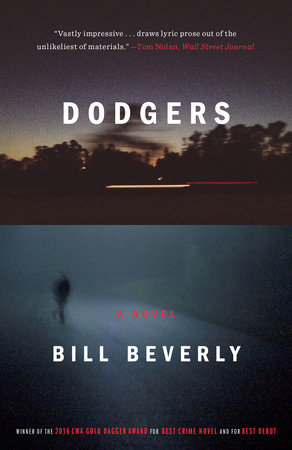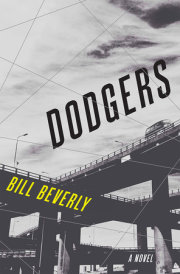***This excerpt is from an advance uncorrected proof***
Copyright © 2016 Bill Beverly
DODGERS – Chapter 1
The Boxes was all the boys knew; it was the only place.
In the street one car moved, between the whole vehicles and skeletal remains, creeping over paper and glass.
The boys stood on guard. They watched light fill between the black houses separated only barely, like a row of loose teeth. Half the night they had been there: Fin taught that you did not make a boy stand yard all night. Half was right. To change in the middle kept them on their toes, Fin said. It kept them awake. It made them like men.
The door of the house opened and two U’s stumbled out, shocked by the sun, ogling it like an old girl they hadn’t seen lately. Some men left the house like this, better once they’d been in. Others walked easy going in but barely crawled their way out. The two ignored the boys at their watch. At the end of the walk, they descended the five steps to the sidewalk. One man slapped the other’s palm loudly, the old way.
Again the door opened. A skeletal face, lip-curled, staring: hair rubbed away from his head. Sidney. He and Johnny ran the house, kept business, saw the goods in and the money out with teenage runners every half hour. Sidney looked this way and that like a rat sampling the air, then slid something onto the step. Cans of Coke and energy drink, cold in a cardboard box. One of the boys went up and fetched the box around; each boy took a can or two. They popped the tops and stood drinking fizz in the shadows.
The morning was still chilly with a hint of damp. Light began to spill between the houses, keying the street in pink. Footsteps approached from the right, a worker man leaving for work, jacket and yellow tie, gold ear studs. The boys stared down over him and he didn’t look up. These men, the black men who wore ties with metal pins, who made wages but somehow had not left The Boxes: you didn’t talk to them. You didn’t let them up in the house. These men, if they came up in the house and were lost, someone needed them, someone would come looking. So you did not admit them. That was another thing Fin taught.
Televisions came on and planes flashed like blades in the sky. Somewhere behind them a lawn sprinkler hissed fist fist fist, not loud but nothing else jamming up its frequency. A few U’s came in together at seven and one more about eight, crestfallen: he had that grievous look of a man who’d bought for a week but used up in a night. At ten the boys who had come on at two left. The lead outside boy, East, shared some money out to them as they went. It was Monday, pay day, outside the house.
The new boys at ten were Dap, Antonio, Marsonius called Sony, and Needle. Needle took the north end, watching the street, and Dap the south. Antonio and Sony stayed at the house with East, whose twelve hours’ work ended at noon. Antonio and Sony were good daytime boys because they knew how to look all right, look busy. The night boys, you needed boys who knew how to stay quiet and stay awake. The day boys just needed to know how to look quiet.
East looked quiet and kept quiet. He didn’t look hard. He didn’t look like much. He blended in, didn’t talk much, was the skinniest of the bunch. There wasn’t much to him. But he watched and listened to people. What he heard he remembered.
The boys had their talk – names they gave themselves, ways they built up. East did not play along with them. They thought East hard and sour. Unlike them, who came from homes with mothers or from dens of other boys, East slept alone, somewhere no one knew. He had been at the old house before them and he had seen things they had never seen. He had seen a reverend shot on the walk, a woman jump off a roof. He had seen a helicopter crash into trees and a man, out of his mind, pick up a downed power cable and stand, illuminated. He had seen the police come down and still the house continued on.
He was no fun, and they respected him, for though he was young, he had none in him of what they most hated in themselves, their childishness. He had never been a child. Not that they had seen.
A fire truck boomed past some time after ten, sirens and motors and the crushing of the tires on the asphalt. The firemen glared out at the boys.
They were lost. Streets in The Boxes were a maze: one piece didn’t match up straight with the next. So you might look for a house on the next block, but the next one didn’t follow up from this one. The street signs were twisted every way or were gone.
The fire truck returned a minute later going the other way. The boys waved. They were all in their teens, growing up. But everyone liked a fire truck.
“Over there,” said Sony.
“What?” said Antonio.
“Somebody house on fire,” said Sony.
The smoke rose soft and gray against the bright sky. Probably a kitchen fire, East said. No ruckus, nobody burning up. You could hear the wailing a mile when someone was burning up, even in The Boxes. But more fire engines kept rumbling in. They heard them on the other streets.
A helicopter wagged its tail overhead.
By eleven it was getting hot and two men crashed out of the house. One was fine and left, but one lay down in the grass.
“Go on,” Sony told him.
“You shut the fuck up, young fellow,” said the man, maybe forty years of age. He had a bee-stung nose, and under his half-open shirt East saw a bandage where the man had hurt himself.
“You go on,” said East. “Go on in the back if you got to lie down. Or go home. Not here.”
“This my house, son,” said the man, fighting to recline.
East nodded, grim and patient. “This my lawn,” he said. “Rules are rules. Go in if you can’t walk. Don’t be here.”
The man put his hand in his pocket but East could see he didn’t have anything in there, even keys.
“Man, you okay,” East said. “Nobody messing with you. Just can’t have people lying round on the yard.” He prodded the man’s leg lightly. “You understand.”
“I own this house,” said the man.
Whether this was true, East did not know. “Go on,” he said. “Sleep in back if you want.”
The man got up and he went into the back yard. After a few minutes, Sony checked on him and found him asleep, trembling, fighting something inside.
The fire smoke thinned, then came thicker. Trucks and pumps droned and down the street some neighbor children were bouncing a ball off the wall. East recognized the two kids – from a neat house with green awnings, where sometimes a white Ford parked. These kids kept away. Someone told them, or perhaps they just knew. For the last two days there had been a third girl playing too, bigger. She could have grabbed every ball if she’d wanted, but she played nice.
East made himself stop watching them, studied the chopper instead where it dangled, breaking up the sky.
When he glanced back, the game had stopped and the girl was staring. Directly at him, and then she started to come. He glared at her but she kept advancing, slowly, the two neighbor kids sticking behind her.
She was maybe ten.
East pushed off. Casually he loped down the yard. Sony was already bristling: “Get back up the street, girl.” East flattened his hand over his lowest rib: Easy.
The girl was stout, round-faced, dark-skinned, in a clean white shirt. She addressed them brightly: “This a crack house, ain’t it?”
“Naw.” East glanced at Antonio. “Where you come from?”
That’s what Fin said: everywhere else, they thought it was all crack.
“I’m from Jackson, Mississippi. I go to New Hope Christian School in Jackson.” She nodded back at the neighborhood kids. “Them’s my cousins. My aunt’s getting married in Santa Monica tomorrow.”
“Girl, we don’t give a fuck,” said Antonio up in the yard.
“Listen to these little gangsters,” the girl sang. “Y’all even go to school?”
Probably from a good neighborhood, this girl. Probably a mother who told her Keep away from LA ghetto boys, so what was the first thing she did.
East clipped his voice short. “You don’t want to be down here. You want to get on and play.”
“You don’t know nothing about what I want,” boasted the girl. She waved at Antonio. “And this little boy here who looks like fourth grade. What are you? Nine?”
“Damn,” Sony cheered her, chuckling.
Somewhere fire engines were gunning, moving again; East stepped back and listened. A woman and a daughter walked by arguing about candy. And the helicopter chopping. It tensed East up. There were too many parts moving.
“Girl, back off,” he said. “I don’t need you mixed up.”
“You’re mixed up,” said the girl. She put one hand on the wall, immovable like little black girls got. A fighter.
This kid, East snorted. The last thing you wanted up by the house was a bunch of kids. Women had sense. Men could be warned. But kids, they were gonna see for themselves.
A screech careened up the flat faces of the street, hard to say from where. Tires. East’s talkie phone crackled on his hip. He scooped it up. It was Needle at the north lookout. But all East heard was panting, like someone running, or being held down. What is it, East said, what is it.
He scanned, backpedaling up the lawn.
Something was coming. Both directions, echoing, like a train.
He radioed inside. “Sidney. Something coming.” The helicopter was dipping above them now.
Sidney, cranky: “Man, what?”
“Get out the back now,” East said. “Go.”
“Now?” said Sidney incredulously.
“Now.” “You boys get,” he ordered Antonio and Sony. Knowing they knew how and where to go. Having taught them what to do. Everyone on East’s crew knew the yards around, the ways you could go, he made sure of it.
The roar climbed the street – five cars flying from each end, big white cruisers. They raised the dust as they screeched in aslant. East thumbed his phone back on.
“Get out. Get out.” Already he was sliding away from the house. His house. Red Coke can on its side in the grass, foaming. No time to pick it up.
Sidney did not radio back.
How had this gotten past Dap and Needle? Without a warning? Unaccountable. Angry, he slipped down to the sidewalk. The smell of engine heat and wasted tire rubber hung heavy. The other boys were gone. Now it was just him and the girl.
“I told you,” he hissed. “Go on!”
Stubborn thing. She ignored him. Staring behind her at the herd of white cars and polished helmets and deep black ribbed vests: now, this was something to see.
Four of the cops got low, split and gang-rushed the porch.
Upstairs a window was thrown open, and in it, like a fish in rusty water, an ancient, ravaged face swam up. It looked over the scene for a moment, then poked out a gun barrel. East whirled then. “Damn!” he yelled. “Get down! Get out of here!”
The girl of course did not budge. The pop-pop began.
East hit the ground below a wall’s rampart. Beneath the guns’ sound the cops barked happily, lowering behind their cars like it was TV. Everyone took shelter, except the copter and the street dogs, howling merrily, and the Jackson girl.
East fit behind a parked Buick, rusted red. His breath fled him, speedy and light. The car was heat-blistered and he tried not to touch it. Behind him the air was clouding over with bullets and fragments of the front of the house. The police radioed to each other behind their cruisers. The upstairs gun cracked past them, around them, off the street, into the cars, perforating a windshield, making a tire sigh.
The girl, stranded, peered up at the house. Then she faced down to where East had run, seeing he’d been right. She caught his eye.
With a hand he began a wave: come with me. Come here.
Then the bullet ripped her.
East knew how shot people were, stumbling or crawling or trying to outrace the bullet, what it was doing inside them. The girl didn’t. She flinched: East watched. But she put her hands forward and gently she lay down. Uncertainly she looked at the sky, and for a moment he disbelieved it all – it couldn’t have hit her. The girl was just crazy. Just as unreal as the fire.
Then the blood began inside the white cotton shirt. Her eyes wandered and locked on him. Dying fast, and gently.
The talkie whistled again.
“God damn you, boy,” Sidney panted.
The police in the back saw their chance and three of them aimed their shot. The gun fell, rattled down the roof. Just then the four cops on the porch kicked in the door.
“You supposed to warn us,” crackled Sidney. “You supposed to do your job.”
“I gave you all I got,” East said.
Sidney didn’t answer. East heard him wheezing.
He got off the phone. He knew how to go. One last look – windows blown out, cops scaling the lawn, one U stumbling out as if he were on fire. His house. And the Mississippi girl on the sidewalk, her blood on the crawl, forming a long finger toward the gutter, finding its way. A cop bent over her, but she was staring after East. She watched East all the way down the street till he found a corner and turned away.
. All rights reserved. No part of this excerpt may be reproduced or reprinted without permission in writing from the publisher.










